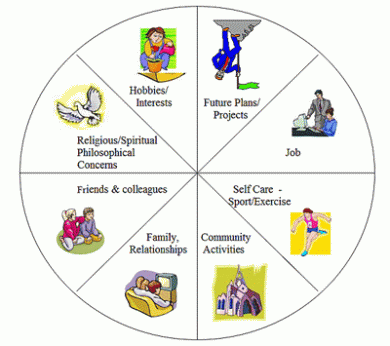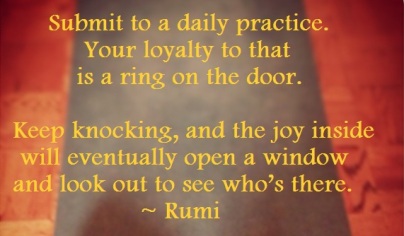My last post was pretty well received overall, but I did get some flack. My repetition of “do the Work” seemed harsh and demanding to some people, triggered some defensiveness, and those responses ranged from dismissive of the concept to insulting me personally.
I just didn’t get what all the fuss was about. I was being totally clear. Right? Well, maybe not. Maybe I should have spent a bit more time defining and unpacking what I meant.
What I Mean When I Say “Work”
“Work” refers to anything you and the Powers with which you interact think you should be doing.
That’s it. That’s the whole shebang.
If your Work consists of pouring tea and saying “hi” for 10 minutes every second Tuesday, that’s fine. If your Work consists of every spare hour in your day, that’s fine. It’s up to you and the Powers, and anyone else’s opinion about it matters not at all.
So I was confused with the kick-back. How does stating “do the Work” – a short form of “do what the Powers want you to do” – make anyone defensive? It’s not like I was specifying what the Work was, I was just encouraging people to get out there and do it.
After thinking about it a bit I realized it was because “work” is a loaded term, and I wasn’t’ accommodating the assumptions people make about it. I talked it out with some people, thought about it, did some meditation, and worked out what some of those assumptions might be. This isn’t a comprehensive list, but these are the topics that came up most often during my discussions.
Assumptions About “Work”
Assumption Number 1: Types of Work are somehow hierarchically arranged.
Thanks to the monotheistic framework many of us still carry around in our heads we’ve got this idea that “sacred Work” and “secular Work” are separate things. Sacred Work consists of typical clergy stuff like leading rituals and kneeling at altars. Secular Work involves making art or raising children or having a career. Sacred Work is often seen as more valid and more appreciated by the Powers than secular Work, and if you’re called to do Work on the secular side you’re “not as good as” those doing work on the sacred side.
That is, of course, bullshit. *shrug* When we’re dealing with the number of people on this planet, and the relationships each of those people can form with the lengthy list of Powers out there, thinking that every Power wants or needs the same thing from every person is ridiculous. Intellectually we can see that when we’re looking at it. But emotionally our default is still “clergy is better than laity, and monastics are like clergy squared”. That’s what we learned as children, and it’s hard to overcome that kind of embedded bias.
The most obvious consequence of this idea is that people overextend. As I’ve mentioned before, there are simply not enough hours in the day to work a full-time job and raise a family and have a social life and have hobbies and spend hours a day in front of an altar and sleep. No one can do it all. Something’s got to give somewhere. And when someone breaks, the spiritual work is usually the very first thing to go. It makes a helluva lot more sense to try to balance it from the get-go, doesn’t it?
And if we’re not careful, we’ll get so overwhelmed that we’ll burn out completely. At which point no Work gets done at all. How is that helpful?
We have to understand – and appreciate, and support – that the Powers might want us to raise children as our Work. Or make art. Or devote our lives to medicine or law or teaching or building things. There are so many ways out there to serve, and all of them are important and valuable.
Assumption Number 2: The Work we do affirms and legitimizes our practice.
The key question to ask ourselves when considering this assumption is exactly W/whose affirmation/legitimization/approval are we looking for here? If we’re looking to have our practice approved by other devotional polytheists we need to step back and rethink things. Because really? It does not matter what other devotional polytheists think about our work. All that matters is what the Powers think about our work. If They think we’re doing what we’re supposed to be doing, then we’re good to go. All that other stuff can get in the way.
Now this is not a “get out of jail free” card or anything. You’ve still got to take action to have a practice. I mean, doing something is the definition of practicing it. But the type and amount of action you take is strictly between you and the Powers. Anyone else who tries to judge you is exercising the worst sort of hubris, and you trying to meet a human’s standards with your practice completely misses the point.
Assumption Number 3: The time and energy devoted to our Work must meet some sort of minimum requirement.
I am sworn to the service of my Lady, and She’s fairly demanding with my time. I spend a minimum of an hour a day in prayer and meditation, and more time outside of that on things like teaching classes and writing blog posts. It’s all part and parcel of the Work I do for Her.
But that is not some standard others have to meet. There are reasons my Work manifests the way it does – many if not most of them in my own head – and it makes no sense for other people to try to pattern their Work off of mine. That’s like trying to treat your spouse the same way your BFF treats theirs. The relationships are entirely different because the people involved are different, and that affects how things will manifest.
And that’s ok.
Are the Powers happy with the effort you put in to what you do? If so then yay, keep up the good work. If They’re not then step it up – but because THEY want you to, not because you’re patterning your practice off of someone else’s.
Assumption Number 4: The Work we do is pre-defined and pre-determined.
I think that some people see “Do the Work” as “do a specific type of work”. The way I see it all the Powers are individuals, so what They want and need from us will vary as much as They do. However, most of us don’t really have a tradition of practice to fall back on that allows for individuality when it comes to our gods, because most of us are used to only having one. And in the Judeo-Christian sphere the Work we can do for God is very clearly laid out. So obviously the gods we work with as polytheists will have the same type of clearly-laid-out template.
Which is nonsense, of course, once we think about it. My Lady works with me like She does because I’ve got a specific skill/interest set to bring to the table that meshes with part of what She wants to see develop in the world. She’ll work with someone else in a completely different way, because their skill/interest set will be different than mine and will mesh with Her goals differently. And that’s just ONE goddess. The other Powers I work with want different things from me entirely, and that’s only to be expected. Add a whole planet full of people, and every Power available, and the way Work is expressed is going to be wildly different between practitioners.
There’s no way the Work we might be called to do is pre-defined or pre-determined. We have to figure out what it is as we go.
So how do I figure out what the Powers want from me?
When we start dating someone many of us gravitate to the standard dinner-and-a-movie trope. It’s easy, it’s established, and it’s safe. Both people involved pretty much know how it goes, so instead of stressing out over what’s going to happen or how formal to dress people can focus on getting to know each other better. The surroundings and basic activities are templates that allow us to focus on all the other stuff faster.
In the beginning that’s all our Work is. It’s a stand-in template that gives us a place to start until we figure out where this new relationship is going next. It’s all it can be – we haven’t received any other direction. But we’ve got to start somewhere, so basic Hospitality serves as our version of dinner-and-a-movie. For that we need:
1) A place to welcome the Powers when They visit. This is usually an altar or shrine. Setting something like this up is a common first step when trying to connect to a Power.
2) Food and/or drink to make Them feel welcome, which can be pretty much anything at this stage of the game. Call it Cakes and Ale, or offerings, or whatever else you like – sharing this kind of thing with a Power is both common and necessary.
3) The ability to have a conversation, which means we’re learning how to quiet our heads so They have inner silence in which to speak. All that meditation and writing in dream journals and such that newcomers are encouraged to do? It all helps us quiet our heads, which helps us have useful communication.
This is what we mean when we encourage newcomers to “do the Work” and then start off on altars and the like. It’s a bare basics template we can put out there to get the conversation started and the ball rolling. Once things are going well changes will of course be made to this framework, to suit both you and the Powers. You might decide that scheduling this kind of work first thing in the morning never works well for you, so you switch it to right before bed. Some Powers will want regular meditation, and Some will prefer to talk to you in dreams. *shrug* There are as many variations as there are participants, and we have to be willing to go with the flow on this type of thing.
Of course, if the Powers you’re working with happen to belong to a tradition with a known ritual practice (like the Egyptians, for instance) then you might be able to bypass these basics completely and go straight to that. All of that is ok – it just depends on how your relationship with Them develops.
There’s another thing to note about this type of beginning interaction with the Powers. It’s a beginning, and we are nowhere near expert in the process until later.
Practice Makes Perfect
“Like a very talented pianist friend once told me when I was a boy; it’s better to practice a musical instrument for five minutes a day, than to practice for two hours, once a week. It’s something I never forgot.” Make Art Every Day
The idea that daily practice of any skill is important is not a new one. Beginning writers are often told to make time every day to write. Musicians hear the same thing, and dancers hear it too. It’s also recommended for people who engage in meditation. In fact, “do a little every day” is common advice for many skills out there.
Interacting with the Powers is no different, which is why I’m so insistent on the need to do the Work every day regardless of anything else.
For all of the above skills, “do a little every day” is usually followed by “and make it a priority”. It’s so easy for us to get distracted, to reschedule and push off and rush through, and when we finally come up for air from everything else in our lives we realize that our altars are dusty and we haven’t visited the Powers in entirely too long. Making it a part of our daily schedule makes it part of our routine, and once it’s a part of our routine we do the Work as a matter of course. It’s not something we have to force ourselves to do. It just is.
Even better, every session spent at our altars gives us a chance to practice the mechanics. Eventually we know where the tools are, the most effective way to fill the offering dishes, and the words we want to say. We don’t have to think about them anymore – they’re readily accessible and available.
Once that happens we’re able to go beyond the words and the gestures to the meaning/joy/reverence/union/love behind what we’re doing. And our persistence makes it more likely that we’ll make the connections we’re working towards.
So yes, we have to do the Work. Whatever the Work is for you and the Powers needs to be done, and at least in the beginning it helps if it’s done frequently enough that it becomes second nature. Only then can our Work flourish.
I hope that this makes my stance on the issue at least a little more clear.
The next few posts will be much more personal and close-to-home. I’m excited!




Thank you, thank you, thank you for this post.
You’re welcome! I’m so glad you’ve found it helpful!
It’s interesting that it seems like lots of folks don’t want to or can’t acknowledge that secular work is just as important, if not more so sometimes, than sacred work. I mean, if we all did sacred work all the time, nothing would get done, ever. I’ve also been met with hierarchy or work from other folks, as much of my work for the Powers is secular in nature. It is sacred to ME, but that’s because I do it for Them–very few people understand how my day job ties into my relationship with the Mister or how doing undercover sacred whore work is…work. like I said elsewhere, I have my own thoughts that I’ll put together soon, but I love this.
I’ll look forward to seeing your thoughts!
Reblogged this on Lighthouses of the Soul and commented:
Many major dust-ups (especially online) are based on people talking *past* each other – “You keep using that word. I don’t think it means what you think it means.”
A lot of people (and I’m not hiding my part) don’t bother to define their practice, even to themselves; this can trip things up later on. Here’s a good piece on defining the/your/some Work.
Very well said. I’ve often heard of folks who struggle with a personal practice because they are comparing theirs with what others do. This is a good piece for those concerned about “what the neighbors think” AND for those who may be critical of those they feel don’t measure up. There are many ways to serve.
Excellent article. I didn’t take into account how the binary view would have contributed to people being upset/confused about what “the work” meant, and I ought to have, so thank you for pointing that out. It’s been so long since that’s been a concern for me — the work that I do, up to and including the writing that I do — is part of my “work”, as secular as it may look from the outside. It’s been a long while since that hasn’t been the case; I forget that it’s not quite that way for everyone. Good things to remember.